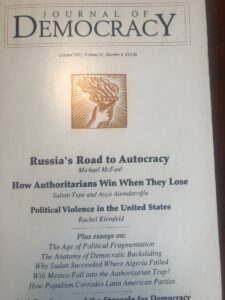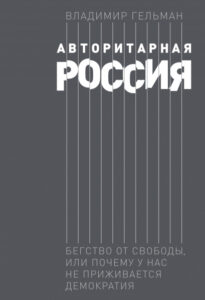
Credit: @WilliamJDobson
Which is the more radical prediction—that Putinism will survive another two decades or that a new system, possibly a democratic one, will replace it? The former seems much more unlikely than the latter, argues Stanford University’s Michael McFaul.
Successful revolution against Putin’s dictatorship seems unlikely. What happens to Russian autocracy after Putin, however, is more uncertain, he writes in Russia’s Road to Autocracy, an article for the Journal of Democracy:
- The current regime is deeply tied to Putin personally. Strikingly, Putin has failed at building an effective political party; United Russia bears little resemblance to the CPSU or the Chinese Communist Party today. Those leading the “power” ministries—the so-called siloviki—will try to sustain Putinism after Putin. But we should not overestimate their capacities, since Putin does not maintain power only through repression, and repression is all that these ministries know.
- Russian economic elites are divided. Those enriched by Putin’s rule want him to stay in the Kremlin. Those who acquired their fortunes before Putin, as well as those in the real private sector who became wealthy by navigating cautiously around his regime, have little enthusiasm for the current political order. …
- Amazingly, new political movements offering an alternative future have survived the truly treacherous late Putin years, demonstrating the appeal of their ideas, the resilience of their convictions, and the strength of their political, organizational, and media skills. There is a reason Navalny sits in prison today; Putin fears him…
- Finally, Russian society is one of the world’s richest and most highly educated that is still ruled by dictatorship. How long will Russia buck the centuries-long trend of modernization fostering democratization? … Even the cultural pull of joining—or more precisely, returning to—Europe might foster democratic change in the long run, as long as illiberal populist movements across the continent do not derail democracy in the short run.
 Under Putin’s murky and kleptocratic leadership, Russia has grown increasingly revisionist, particularly in relation to Eastern and Central Europe, adds analyst James Rogers, co-founder of the Council on Geostrategy. But unlike the PRC, Russia lacks the material power to push back against the leading liberal democracies in the Euro-Atlantic area. Unlike the CCP’s counter-systemic offensive, the Kremlin’s approach is ‘anti-systemic’. Whereas the CCP seeks to rewrite the rules of the international order in accordance with its own interests, Putin’s kleptocracy seeks only to degrade or scramble them, he writes for the UK-based Foreign Policy Centre.
Under Putin’s murky and kleptocratic leadership, Russia has grown increasingly revisionist, particularly in relation to Eastern and Central Europe, adds analyst James Rogers, co-founder of the Council on Geostrategy. But unlike the PRC, Russia lacks the material power to push back against the leading liberal democracies in the Euro-Atlantic area. Unlike the CCP’s counter-systemic offensive, the Kremlin’s approach is ‘anti-systemic’. Whereas the CCP seeks to rewrite the rules of the international order in accordance with its own interests, Putin’s kleptocracy seeks only to degrade or scramble them, he writes for the UK-based Foreign Policy Centre.
Russia has emerged over the past two decades as the world’s leading exporter of instability – a central pillar of Putin’s foreign policy, allowing Moscow to undermine potential opponents from within while enabling the Kremlin punch well above its true geopolitical weight, the Atlantic Council’s Iuliia Mendel observes.
In reality, the West is not weak. On the contrary, it is overwhelmingly more economically and militarily powerful than Russia, while also light years ahead in any honest contest of ideas and aspirations, she adds. The main reason why Moscow’s destabilization tactics have proven so successful is because the West refuses to acknowledge the reality of a hostile Russia.

Gelman’s Authoritarian Russia
The emergence of a broad democratic coalition in Russia will be “extremely difficult,” according to a prominent expert. To begin with, such a potential coalition must have the option to participate in the political competition, political scientist Vladimir Gelman tells the Institute of Modern Russia.
Yet Russians are shaped but not trapped forever by historical legacies, immutable cultural norms, or static institutions, adds McFaul, professor of political science at Stanford University, director of the Freeman Spogli Institute for International Studies, and Peter and Helen Bing Senior Fellow at the Hoover Institution. If some Russians in the past took decisions that produced autocracy, others in the future might make choices that engender democracy, he concludes. RTWT







